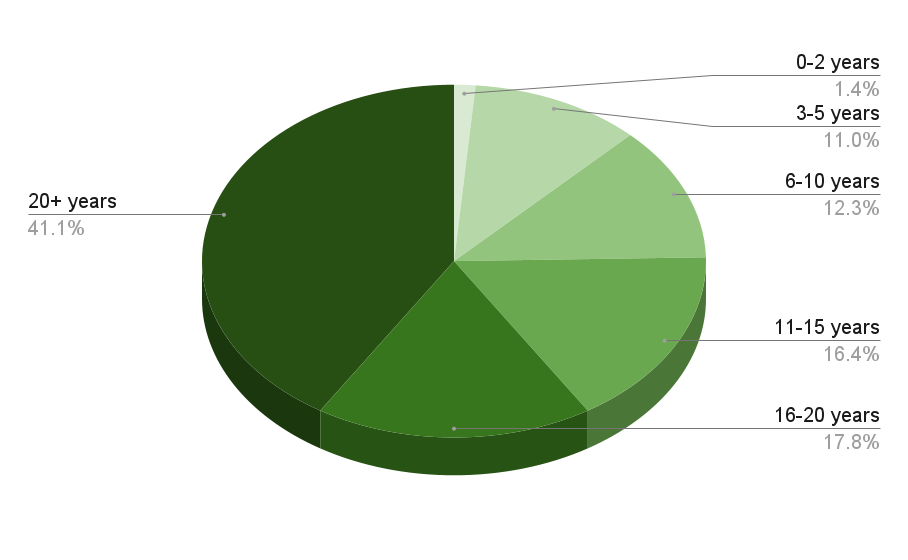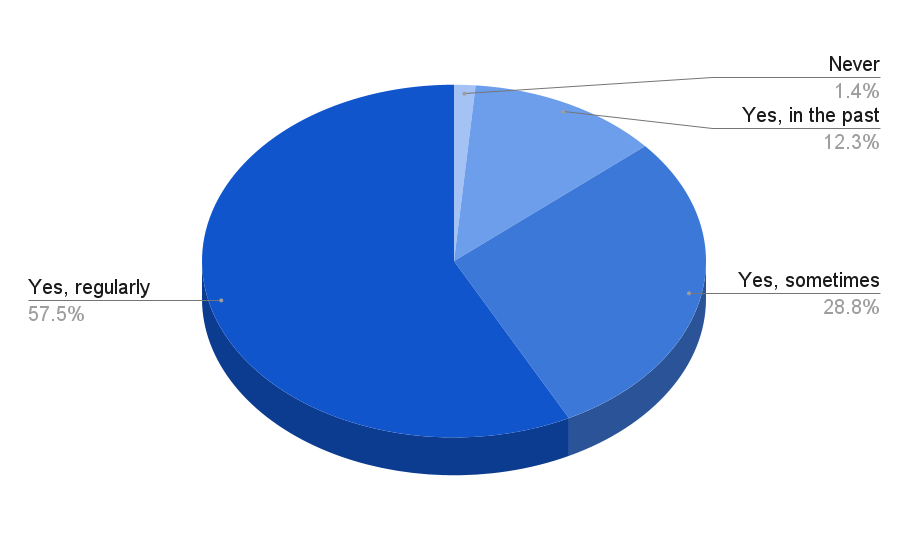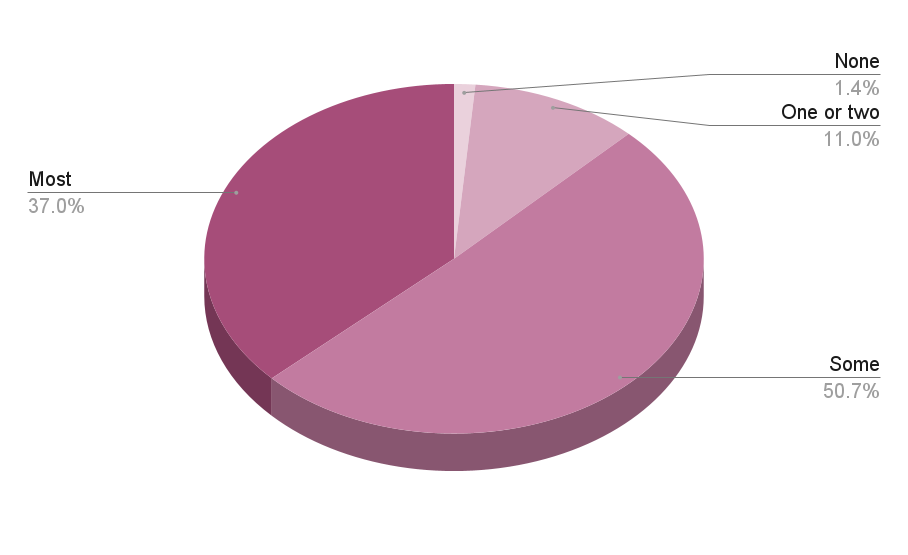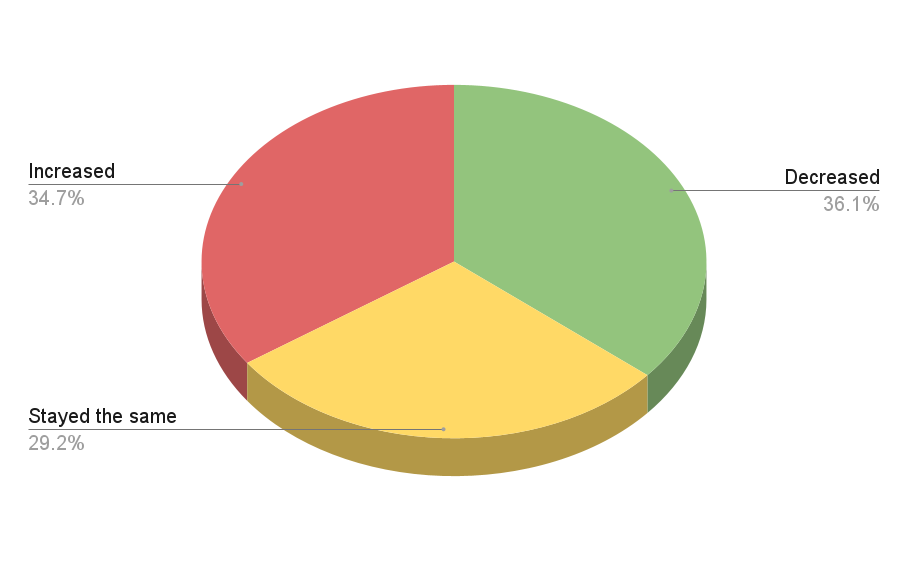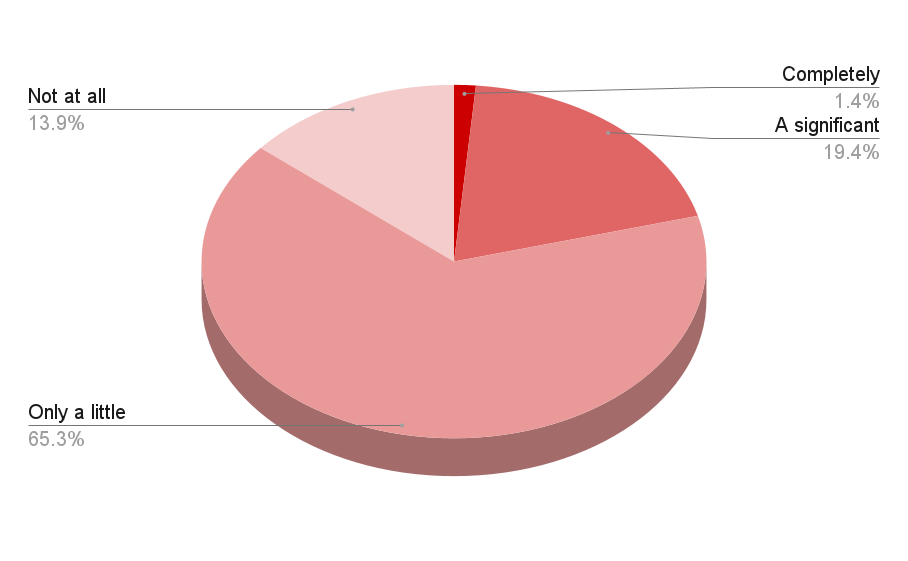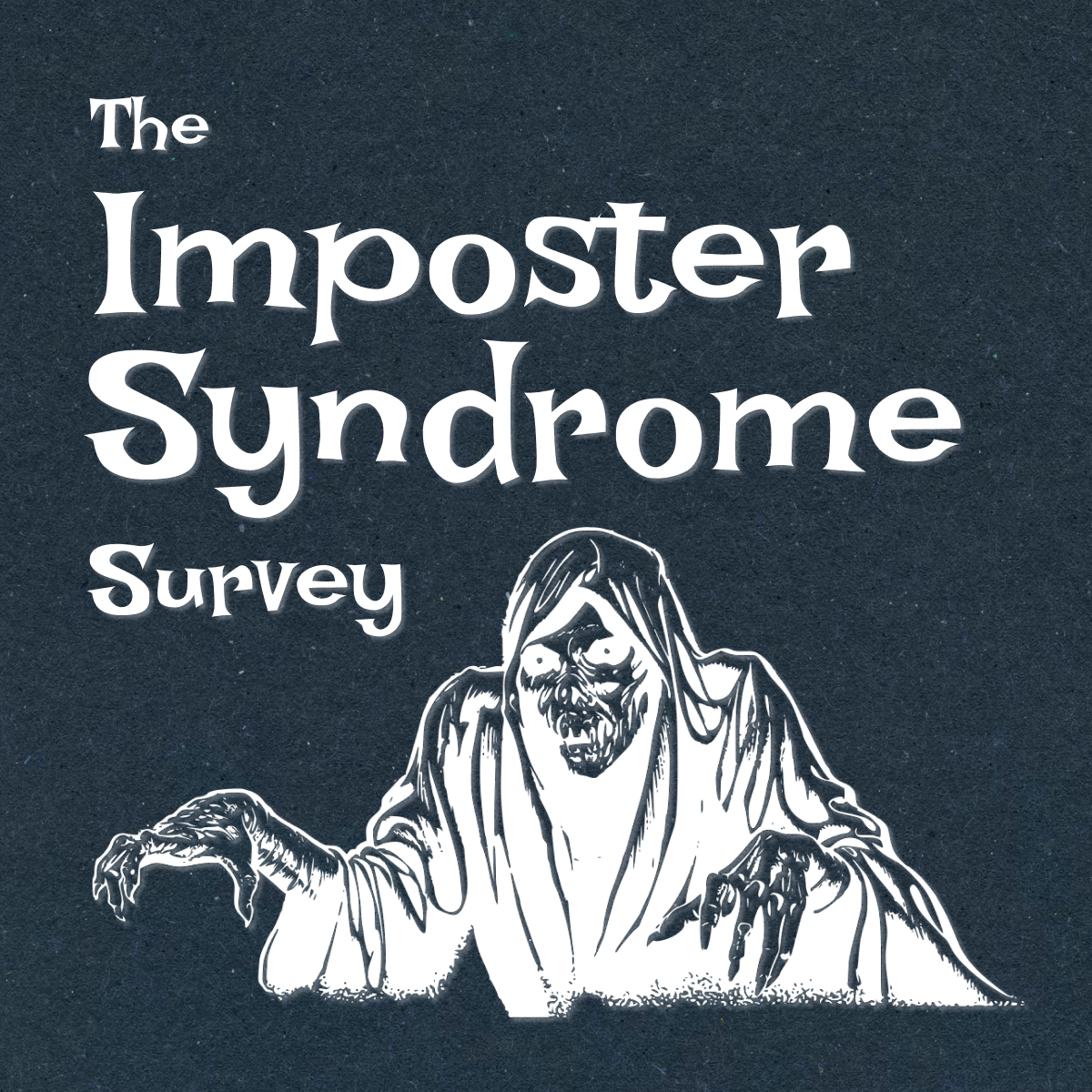👋 Well hello! Welcome to our little newsletter all about personal development and self-help. I hope you find what you read here interesting, and if you do - why not share it with a friend who might appreciate it as well?
The Imposter Syndrome Survey Results
Back in October I opened a survey to try and better understand imposter syndrome - its impact, its effect and how people responded to it. The response was wonderful, with 73 people in total responding to the survey and sharing their experiences. So firstly a huge thank you is due to everyone who took part and shared the survey!
Now it’s time to dig into the results and see what we can learn.
How long have you been working professionally?
Before we starting looking at people individual experiences, I wanted to get a rough gauge of who had responded to the survey.
As you can see, a signficant majority answered as having “20 or more” years of professional experience, with the representation growing smaller for each age group going younger from that.
Have you experienced imposter syndrome yourself in your career?
So almost exclusively everyone who responded to the survey had experienced imposter sydrome at least once, with the majority experiencing it regularly.
It is worth noting that it could well be that people who aren’t affected by imposter syndrome didn’t feel compelled to participate in the survey, which would obviously drastically sway things. My feeling however is that - yes, this is a problem which affects all of us. You are not alone.
How many of your peers do you think are actively affected by imposter syndrome?
Next we looked at people’s perception as to how many others about them experience imposter syndrome.
Over 50% of participants believe that “Some” of their colleagues are affected by imposter syndrome, with “Most” being a close second place. Interestingly, no one answered “All”, suggesting while most of believe we’re not alone in experiencing imposter syndrome, we also believe there are others out there who remain unaffected.
Over time, would you say your sense of imposter syndrome has...
This one resulted in a near equal three-way tie between the three responses of “Decreased”, “Stayed the same” and “Increased” making it difficult to pick out any clear pattern here.
When compared again the responses for how often people experienced imposter syndrome, those who answered “sometimes” also ranked much higher as “decreased” for their feelings over time, whereas those who responded as experiencing imposter syndrome “regularly” were much more likely to report those feelings to have “increased” with time.
Those who reported that their feelings of being an imposter had “only a little” justification (see the next section) were also more likely to report that their feelings of imposter syndrome had decreased over time, suggesting that embracing there is limited truth in these feelings helps to reduce their occurence.
To what degree would you say your feelings of being an imposter are actually justified?
Here we try to gauge how much justification people feel there are in their feelings of imposter syndrome. Here we get into some interesting points.
Firstly, the vast majority believe there is at least some truth in what they are feeling - which is saddening, but again also means that people are far from alone in this. Most of the people who feel there is some truth in their feelings believe that it is only a little, which is positive, but again shows that it doesn’t take much for imposter syndrome to take hold.
The section of people at far end of the spectrum who believe there is either a significant or complete justification in their feelings of being an imposter - I see you and I feel you. I can’t claim enough insight into your personal situation to justify saying that I think your insecurities are unwarranted, but I hope that by seeing the responses of so many other people here will either prompt you to rechallenge your perspective, or will show that there are ways to survive and control the place in which you find yourself currently.
In what ways does imposter syndrome affect you, or has affected you in the past?
While it’s easy to summarise imposter sydrome as “feelings of anxiety and self-doubt” - I wanted to dig into that more and understand the actual impact.
For this question, which was free text - I have gone through each submission and attempted to identify the main themes of how respondees have been impacted by imposter syndrome.
There was one single theme which came up consistently far more than any of the others:
Held back the progression of my career - Many people reported not applying for new roles or promotions, putting themselves out there or even declining job offers because they feared they wouldn’t be good enough:
“Held back from going for a few opportunities thinking I wouldn't be good enough to make it.”
“It has made me stay in jobs where I was unhappy despite having the appropriate education, skills, and experience for others.”
“I think I would be much further in my career than I am currently.”
The next most mentioned themes were:
Not contributing the full value I could do - Such as not speaking up in meetings, not suggesting ideas or pursuing projects where they probably would have brought a real benefit.
“Inability to share thoughts and ideas because everyone knows more than me and my ideas will be dismissed”
“Prevents me from speaking up or giving my opinion as I feel I'll be shot down or found out”
“Stops me pursuing things. Especially side projects, startup ideas and contributing to open source.”
Not challenging others - Not pushing back on ideas of suggestions they could see were flawed or done in a different way, and accepting behaviour they didn’t feel comfortable with.
“Uncertainty when pushing back against a statement/opinion I know/think is wrong in a meeting particularly if the person is more senior/sounds confident in their opinion.”
“Made me apprehensive in raising my concerns about unprofessional working practices”
“Agreeing with others even if I disagree as I don't have the belief that my opinion is as valid.”
Physical symptoms - As with all stress, imposter syndrome can manifest itself physically with mentions of interrupted sleep, anxiety attacks and emotional breakdowns.
Finally, though less reported, these themes were mentioned a few times:
Taking longer to do things - Either through procrastination and similar avoidance strategies, or being crippled by doubt.
Dread and fear - A constant emotional overhead that they will be “found out”.
Isolation and loneliness - Feelings that they are the only person experiencing this, that everyone else is doing so much better and so sharing these feelings would lead to being “found out”.
How do you deal with imposter syndrome?
Now we looked to move from the impact to surfacing how people are coping with their concerns and anxieties.
Again, this was a free text question so I have tallied up all mentions of what I believe where the most common themes in people’s responses and then summarised.
The two most prolific instances were also very closely linked:
Challenging with evidence - Considering times in the past they have been successful, identifying things which suggest or prove that they are actually performing to an acceptable level within their role.
“Look at my resume or LinkedIn like I’m someone else and admire the experience I have”
“I keep a list of compliments from colleagues about a job well done and review that when the imposter syndrome shadow rears its head”
Reflecting and managing self-talk - Reflecting on what you do know, that you are on a journey of continual learning and reframing how these feelings are either temporary or might be turned into positives:
“Try to remember that part of why I'm feeling it is because I'm pushing myself to grow.”
“Self compassion, mindfulness, inner relationship focusing.”
“I keep reminding myself that no one else knows how much experience I have unless I communicate it. So it's up to me to back myself and not be afraid to learn if I'm wrong about something”
Then came:
Pushing on - Choosing to push aside these thoughts and feelings and “cracking on”.
“Just crack on, experience tells me to trust the people who hired or promoted me and to trust my ability to fake it till I make it”
“I just try and crack on with the role I have to do and wish I get results from it.”
Learning - Taking time to improve your skills, identifying the ideas where you feel you might be weak and looking to level them up.
“I try to rely on my transferable strengths and skills, ask how I can bring real value, while learning as much as I can from trusted sources and through practice and reflection.”
“I hit the books, discuss ideas with mentors, and seek improvement.”
Talking openly about it - Sharing their anxiety and feelings with others openly, not necessarily to receive feedback but just to put their thoughts out into the open.
“Speaking to people (friends, family, support networks) about it gives it a name and identifies how I am feeling. It helps me identify that it is only a feeling and not based on facts.”
Seeking external perspectives - Rather than relying on their own, potentially flawed, viewpoint - seeking out the opinions and feedback of others to either counter their thoughts, or help identify areas where they can improve. This is through colleagues, peers or by pursuing more formal support in the form of therapy, mentoring or coaching.
“Solicit feedback. The more positive reinforcement I can get, the more confident I can be when sharing my expertise”
“Plenty of mentoring support and guidance from others in the industry helps reinforce what I’m doing is okay”
Accepting it - A few people did admit that they were yet to find a positive way of dealing with or avoiding their imposter syndrome and instead just live with the situation.
Finally, these ones didn’t come up a lot but I felt were important enough to share:
Taking time out to recharge and removing yourself from the situation
Using mindfulness and breathing exercises to help calm the mind
Spending extra time to prepare for situations which you are nervous about
There we have the main results from the survey. How does this align with your expectations? Have you noticed anything which I haven’t picked up on? What questions would you like to have seen asked?
Finally, there was one more question at the end of the survey titled “What advice would you want to give to someone struggling with imposter syndrome?”. The responses to this were wide and varied, but each was individually beautiful and powerful. So rather than try to distill these down into numbers or bullet points, I want to dedicate the next issue of the Get Better Gazette to share them all in their entirety. So look out for that in a couple of weeks’ time and till then take care, stay strong and be kind.
Bonus bits
🎧 This is an interesting listen
Hal Elrod’s Miracle Morning is something I’ll likely talk more about in the future, but if you’ve not come across it before, this episode of his podcast gives a full overview of what it is all about. I definitely don’t think the Miracle Morning is for everyone, but there is a ton of powerful ideas in there.
📺 I’ve been watching
I’d been starting to grow tired of the spate of shows trying to recapture the dark magic of Game of Thrones, each quickly fizzling out into tired tropes and non-sensical storylines. I can’t even bring myself to try Rings of Power. The Wheel of Time adaptation however, I think might be onto something quite special - the first season was filled with promise and interesting, fresh ideas. The second series then showed that there was both more where that came from and that they weren’t afraid to push into new directions and continue to deliver emotional gut punches (OMG the trial of the three arches).
👨🎤 I love a good cover
Last Christmas - Originally by Wham! - Covered by Jimmy Eat World
Join our community on Slack
You're a wonderful human being. 👏



